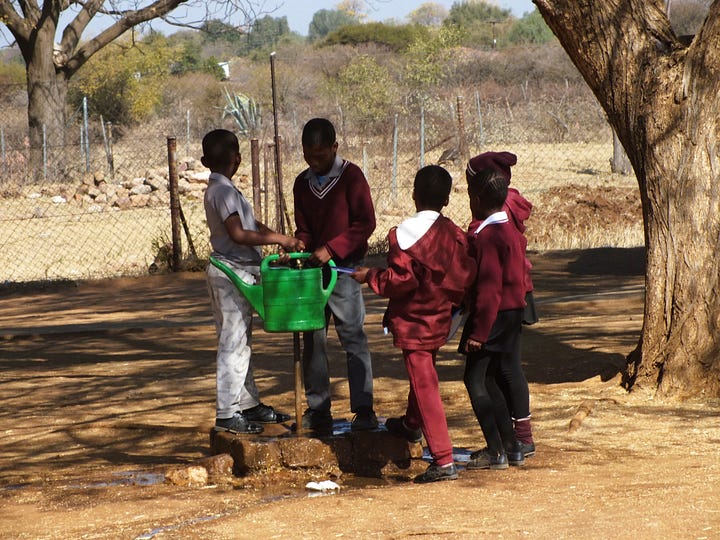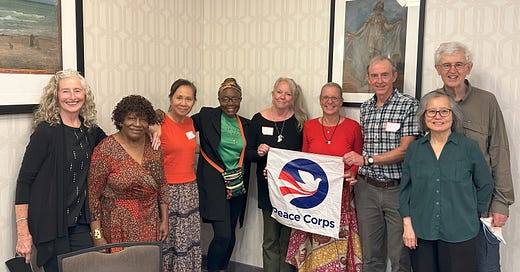A couple of years back — when I was starting the transition from a life of entrenchment in the United States to this journey that I’m currently on — many acquaintances were incredulous to hear of my plan. I could see it in their blank, stony faces; hear it their trite, perfunctory responses; and feel it in their awkward silences. They didn’t have to speak to convey the sentiment so foremost in their minds: ‘What in the world has come over you?’ Or ‘Why on earth…?’ And with good reason — let’s face it, in our culture it’s a little unusual for someone entering their seventh decade to abandon a comfortable job and life for a plane ticket attached tenuously to a promise of adventure and fulfillment 8,000 miles away. Certainly, the more customary (and not entirely unappealing in its own right) route would have been to invest in golf lessons (God knows I need them), learn to fly-fish or take up oil painting from the back porch of a bungalo somewhere where the everyday tongue was English and a university medical center, Home Depot superstore and Bob Evans restaurant stood within a short drive. Tempting though that might have been, it’s not the path I chose and — a year and a half into this ‘madness’ — I have yet to endure a regret as an ‘older’ volunteer in Peace Corps - South Africa.
When someone mentions ‘Peace Corps volunteer’ to you what comes to mind? Perhaps something on the order of a circle of young people — bandanas on their brows and Birkenstocks on tier feet — humming a version of ‘Uncle John’s Band,’ if not ‘Kumbaya’. Okay, maybe not quite; but I’ll venture that you wouldn’t conjure a gathering of folks with frosty hair and lined faces behind bifocal lenses, wearing oxblood Rockports and comparing deals on memory foam. Indeed, through the 65-year history of this organization, the volunteer pool has been dominated by young adults, many of them just out of college; and a Peace Corps training session is far more inclined to look like a university seminar than an American Association of Retired Persons (AARP) convention. But in spite this youthful image, there has always been a small contingent of Americans who, for reasons of their own, have answered the call to serve at a later stage in life.
So this land has the distinction of being the ‘oldest’ P.C. country as measured by mean; though, by perhaps the more representative measure median, South Africa ranks fourth (out of approximately 60 countries): still up there. On the youthful end of the spectrum we find countries from Panama and Peru, to Zambia and Tanzania to Sri Lanka and Indonesia (the latter three do have upper age limits for certain sectors).
Among our cast of 23 trainees that landed in Johannesburg that evening in August 2023 were nine individuals beyond the age of 50 — though that number has since been winnowed down to five. They came from different places and backgrounds: three were born outside of the U.S. All had had long careers in fields from healthcare to technology, academia, business, and non-profit administration. They came for a variety of reasons — most leaving behind children, grandchildren or siblings in addition to properties, vehicles, insurance policies, pensions, and assets of other kinds. For some this was their first go with the Peace Corps, while others had undertaken multiple tours: three in the case of one persevering individual. Two are serving as a couple. So, how is life in the Peace Corps for these demographic curve-busters? Or if I may borrow from the late Admiral Stockdale: who are we and what are we doing here?
Serving as a ‘senior’
In so many of life’s endeavors age can serve as both an advantage and a hindrance, and Peace Corps service is no different. Let’s start with the upsides…
Respect — more than in some countries (my own included) age and the views of the elderly really seem to be valued here. Perhaps it goes to the divine hierarchy set out in many African religions: there’s God, then the ancestors and then the mortals. And of the earthly set, of course, the elderly are usually the closest to becoming ancestors. Perhaps it’s not that simple but, suffice to say, in this sense advanced age works to one’s benefit here. It’s evident in the consistently polite greetings that I receive and the deference and general pleasantness that I encounter in daily interactions. Although there have been exceptions: one time in a checkout line I unexpectedly ran amok of another shopper who — having taken an interest in my status as stranger — went on to rant about how I was '‘too old to teach our children.” Coincidentally she claimed to be my very age.




Experience — with extensive backgrounds in the working world, most older volunteers come equipped with basic problem-solving acumen and specific skills — teaching, nursing, administration, grant-writing technical know-how, etc. — that they draw upon in their Peace Corps service. Even if their technical skills don’t fit closely with their assigned roles, seniors can tap into a well of lessons learned through lives of social interactions, managing families, finances and health issues, traveling, and other travails. The importance of intangibles such as these to successful Peace Corps service, cannot be overestimated.
Gratitude — many older Americans who have led rewarding lives are quick to acknowledge their good fortunes and comfortable status, and view them as an opportunity to give something back. Instead of continuing to push for more of the same — financial prowess, accolades and social acceptance in their familiar circles — they choose to turn their energies elsewhere — where they attempt to make a more profound or personal impact — perhaps on a more human scale. Or, in the words of one seasoned veteran of multiple tours: “to pay it forward.” Such reasoning was a major factor that drove me to trade my career for a stint in the Peace Corps a few years before qualifying for Social Security benefits; my retirement became an off ramp to the next endeavor.
The long view — As we age — and our lived days begin to outnumber those that remain — our concept of time certainly changes. No longer do the days seem to drag on and the weeks stand still. I’m reminded of this changing perception in conversations with my younger post-mates, some of whom seem to struggle with the slow creep of time in their villages and throughout their service. I too remember struggling with this languid pace of things — and with how to pass seemingly endless strings of long hot days — while serving decades ago in the West African Sahel.
The long view is just as much a state of mind — a way of viewing situations, circumstances, and problems. When you’ve been through a lot of years and trials, you realize the ephemeral nature of reality and that — regardless of how bad something may seem in the moment — it’s eventually going to pass and may even be expunged from you memory within a few days or weeks. It’s also how we weight or value things. Sometimes something just isn’t worth the extra effort, worry or headache; and it’s important to recognize when we’re at that point.
Lastly, having got through the gristmill of life, many older people aren’t feeling as harried anymore: their kids are grown, their debts paid, their annuities yielding, and their knees creaking. For many of us there’s less of a pull to rush home and on to the next pressing obligation: the GREs, graduate school, that big job, or smouldering former college romance. That can be liberating, though perhaps a little bewildering for some; it gives you the time and uncluttered space to truly appreciate what you are doing, and to think deeply about what’s important to you and what you really want.
Don’t get me wrong — this way certainly isn’t all roses: there can be some real impediments to taking on such an endeavor later in life. And I admire my younger colleagues for the tireless energy, talent, and creativity that they bring to bear every day.
Rigidity — As I was told in stark terms by a Peace Corps official: “older people are more set in their ways.” And, although that’s not something that someone my age necessary wants to hear, there’s no denying its truth. Indeed this was palpable early on when trainees were required to attend days-upon-days of seminars, submit to competency assessments, comply with seemingly arbitrary rules, and live with strangers in new and sometimes trying circumstances. Many struggled at the outset, but such conditions did seem to disproportionately affect senors who had become accustomed to more independent lifestyles over the years.
Language — Ugh! Of all the age-specific issues, this one may be the sorest among senior volunteers. As you age, your mind changes making processes such as learning and using a new language more difficult. This assertion is refuted in some circles as we learned at the outset of pre-service training but, at least here in South Africa, young volunteers have far outshone their older colleagues in language proficiency, and I would be surprised if this were not the case eleswhere. This is not at all to excuse older people from their linguistic responsibilities as visitors and servants in host communities; it’s more to exhort them to keep their heads high while giving it that tiring, but necessary extra effort.
‘Very old bones’ — perhaps no images of Peace Corps are more etched in many minds than the physical hardships: teeming streets, cramped taxis, dank dwellings, monotonous diets, bracing bucket baths, severe heat, dust storms, exotic diseases and indefatigable vermin. Although this worn-out stereotype, for the most part, doesn’t typify life here, the living conditions faced by many volunteers do tend to be a little more rugged than what they are accustomed to back home; and again, some of these inconveniences seem to disproportionately plague elders. In my view, however — of the variety of challenges that volunteers face in their daily lives — it is the physical rigors that can be most readily overcome with the right mindset, some practice, and a little time. You develop routines and ways of minimizing the inconveniences; you get used to them; and you start to forget about that hot shower, central air-conditioning or Lexus LX back home.
Less energy/daring (here’s where I envy many of my younger colleagues) — I don’t know about you, but I just don’t seem to have as much gas in the tank as I did at 25. After a day at school — while some of my younger friends are busy coaching soccer, running after-school clubs, training for marathons, learning a fourth language and preparing five course meals — I often find myself parked languidly under a citrus tree whiling away the afternoon with V.S. Naipul or Willa Cather. Truly many days do feel exhausting; and it's more than just the constant buzz of school life: the daily assortment of domestic chores (hauling water, washing dishes, bathing, etc.) demand more attention as well. But there’s a lot to be said for a good night’s sleep — something that seldom alludes me here — and I’ll take that every time.
Making a difference…
Though gone may be the days of planting 1000 seedlings by noon, dancing till two, and riding a freight car through the cool desert night, that doesn’t mean that — out there somewhere, somehow — there isn’t still a difference to be made, a dream to be lived.
















Hey now, not so fast - right now we're just grateful to be funded through September. After that we'll see what life deals...
dj
Scott,
So nicely stated. I agree wholeheartedly that at this stage it's all about the that that core intact.
It's worth noting that those shorter-term P.C. response positions are a bit different than the traditional 2-year postings (the focus of my recent post) though, certainly, there is a fair degree of overlap. For some, perhaps like yourself, the shorter position might be a good way to test the waters of post career life, without completely cutting the ties.
Happy 58th! Lemme know what that committee within comes up with...
dj